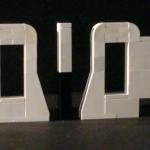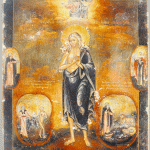
“Beware of practicing your piety before men in order to be seen by them; for then you will have no reward from your Father who is in heaven” (Matt. 6:1 RSV). True glory is found in humility. We should not be seeking to make ourselves look great in front of others. When we do so, and we receive accolades because of the way we appear to others, we might be pleased with ourselves, for we have gained what we desired, but that will be all that we have achieved. Such fame, such glory, is fleeting. When we seek only to be glorified by others, we want temporal glory, and if we are lucky, we might get it, but what we will not get is true glory. This is the reality of all such vainglory. In the end, fame will wane and all who gain it will find it will eventually be as naught, if not in their lifetime, then when they die. And then what shall they have? Nothing. On the other hand, if we do not pursue such vainglory, if we do not care for such accolades, indeed, if we flee from it, we will find our humility will be accepted and loved by God, and so in death, if not in life, we will be truly glorified, and it will be a glory without end, for we will participate in true glory, the glory of God, a glory which is eternal. And so, let us not only heed the warning, but also the promise, which Christ gave us: “For every one who exalts himself will be humbled, and he who humbles himself will be exalted” (Lk. 14:11 RSV).
Abba Simon embraced humility through his ascetic practices. It seems, without desiring it, he had gained some repute om the world for what he had accomplished, and many people wanted to come to him, to visit him, to shower him with praise, hoping to receive a blessing from him in return. He was, however, a humble monk, and with that humility, was not interested in such praise. If he heard someone was coming out to meet him, he did what he could to make them go away. We have in the Sayings of the Desert Fathers two different stories telling us how he did so. him went away. In the first, he hid who he was from the magistrate, so that the magistrate, thinking he had not found him, left him in peace:
A magistrate came to see Abba Simon one day. When he heard of it, he put on his apron and went out to attend a palm-tree. When the visitors arrived they called him out, ‘Old man, where is the anchorite?’ He replied, ‘There is no anchorite here.’ Hearing these words, the magistrate went away.[1]
The next time he heard a magistrate was coming to visit him, Simon acted rough and uncouth in front of the magistrate, making the official despise him so as to go away without praising him:
Another time, another magistrate came to visit him. The clergy went on ahead and said to the old man, ‘Abba, get ready, for this magistrate has heard of you and is coming for your blessing.’ So he said, ‘Yes, I will prepare myself.’ Then he put on a rough habit and taking some bread with cheese in his hands he went and sat in the doorway to eat. When the magistrate arrived with his suite and saw him, he despised him and said, ‘Is this the anchorite of whom we have heard so much?’ and they went away at once. [2]
In the first instance, Simon did not view himself worthy of the status of an anchorite to be praised, and so he denied such an anchorite was around for the magistrate to visit. Some might wonder whether or not he was justified in doing this, because it would seem he deceived the magistrate. But because of his humility he did not view himself worthy of the title and honor being used to describe him, it can be said he did not lie. It is also possible, though we do not know, he might even have been pointing to the cell, which, at the time, he was not in it, in which case, he clearly would not have been lying. In the second instance, we find that Simon allowed the magistrate’s false conceptions of what an anchorite should be like serve him, and so he did not have to say a word in order to be left in peace. He just sat down in rough clothing, eating while the magistrate was there. Eating in such a way, he appeared to be a glutton, eating out of turn, because it would not have been the normal time for an ascetic to eat. It was for this reason why the magistrate, who came to bless him with earthly rewards, left disgusted, thinking that Simon was a phony monk, getting praise for a lifestyle that he did not fulfill. In this fashion, Simon allowed himself to be despised by the magistrate so that he could be seen as acceptable by God. “God chose what is low and despised in the world, even things that are not, to bring to nothing things that are, so that no human being might boast in the presence of God” (1 Cor. 1:28-29 RSV). His humility proved true. He didn’t want to appear to be pious and be praised; he wanted to truly be pious, to truly live out his ascetic calling, and so he embraced humility as a way to find true piety and glory with God.
It is a common occurrence for those who are humble not to want attention to be brought to themselves, especially if and when they are trying to sustain their humility, knowing that it could easily be overcome if they were to receive too much praise. This is not to say people are wrong to praise those who are humble and holy, for of course, what is good is worthy to be praised, but we must also be mindful of how we do so, making sure we do not harm those whom we want to praise. There is a time and place for everything. However, if all we want to do is pursue some holy person, to praise them as a way of getting their attention, and once we have it, use them and their holiness as a tool for our own private gain, we should not be surprised if they see through our praise and want nothing to do with it. They know accepting it will only lead to their downfall. We, too, should see this, and so avoid vainglory as well. That is, we should learn from them we and not seek to be glorified by others, but to find a way to receive and experience true glory in God.
[1] The Sayings of the Desert Fathers. trans. Benedicta Ward (Kalamazoo, MI: Cistercian Publications, 1984), 224-5 [Sayings of Abba Simon 1].
[2] The Sayings of the Desert Fathers, 225 [Sayings of Abba Simon 2].
Stay in touch! Like A Little Bit of Nothing on Facebook.
If you liked what you read, please consider sharing it with your friends and family!













